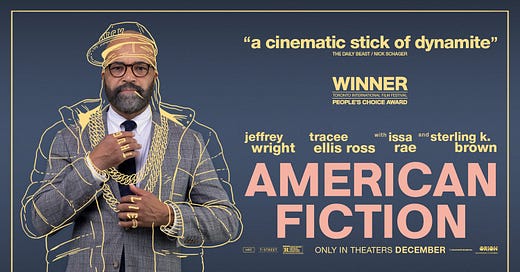Movie Of The Week Review: American Fiction
"Potential is what people see when they think what's in front of them isn't good enough."



R 2023-Comedy/Drama, Run Time: 1hr 57mins
Can Be Seen On: Amazon Prime Video, Apple TV, Sling TV, Roku Channel, Youtube, Google Playstore, and Fandango at Home.
Movie Short Summary: Monk is a frustrated novelist who's fed up with the establishment that profits from Black entertainment that relies on tired and offensive tropes. To prove his point, he uses a pen name to write an outlandish Black book of his own, a book that propels him to the heart of hypocrisy and the madness he claims to disdain.
SPOILER ALERT!!!!!!!!!
Trivia Question #1: What was the original title for American Fiction?
(Answers are at the bottom of this review)
Hello fellow watchers! This week’s movie pick is American Fiction, the brilliant directorial debut of Cord Jefferson, starring Jeffrey Wright, Issa Rae, Tracee Ellis Ross, Sterling K. Brown, and more. This film has been making waves, snagging five 2023 Oscar nominations including Best Picture, Best Actor, and Best Adapted Screenplay (which it won). I’ve been eager to see it ever since the satirical trailer hooked me, but I finally caught it on Amazon Prime Video. American Fiction is a multi-layered film that masterfully blends humor with deep-rooted issues of family drama, race, and the struggles of life that our protagonist, Monk (played by Jeffrey Wright), faces—issues many of us can relate to.
The opening scene sets the tone brilliantly. We find Monk, a literature professor, leading a lecture about the American South. He’s confronted by one of his white students about a short story title, "Artificial Nigger," written on the whiteboard. She finds it offensive. As a Black man, Monk understands the offensiveness but tries to delve deeper into the material until his frustration boils over due to the student's insistence on making it about her own discomfort. This moment encapsulates the hypocrisy and white guilt Monk has to navigate, leading to his forced leave from teaching and setting the plot in motion as he heads to a conference in Boston where his family lives.
Jeffrey Wright is phenomenal, showcasing a full range of emotions as Monk endures some of the worst times of his life. Within days of arriving, Monk loses the family’s glue, Lisa (Tracee Ellis Ross), to a heart attack caused by stress. This tragedy is compounded by the revelation that their mother has been diagnosed with Alzheimer’s. Lisa was not only managing their mother's care but also maintaining peace between Monk and their brother Cliff, who recently came out as gay. One of my favorite scenes is when the family spreads Lisa’s ashes at the beach and is interrupted by a nosy neighbor. Cliff handles it perfectly by threatening to kick his ass, adding humor to the heavy moment and highlighting how Karens often prioritize their feelings over others'.
Trivia Question #2: What book is this film based on?
Monk’s anger and frustration reach a tipping point after his latest book fails to find a publisher. As an outlet, he writes "My Pafology," filled with outrageous racial and offensive tropes, submitting it under the pseudonym Stagg R. Leigh as a joke. To his surprise, a publisher offers a nearly million-dollar advance. Monk takes it further by proposing an obscene title, “Fuck,” expecting rejection. Instead, the publisher offers more money, praising its “honesty” and “daring” nature. This is the part of the movie that really had me laughing as well as Monk joining the judges panel for the Literary award to only have to judge and review his own book “Fuck”. I mean the irony just jumps off the screen when the judges are discussing which book should win the award and the white judges fight hard for the emphasis of needing to acknowledge and listen to black voices but at the same time ignoring the only two black judges (Monk and Sintara) who were against giving “Fuck” the award. I also loved the honest and real discussion that Monk and Sintara have about her book and how hypocritical it is that she is against “Fuck” while she also writes stories that perpetuate the same stereotypical content.
While American Fiction tackles significant themes, it sometimes feels like it’s trying to do too much, diverting from its satirical core. I wished for more of Monk's antics as Stagg R. Leigh and their impact on his career. Some subplots, like Monk’s romantic relationship with Coraline, felt underdeveloped and less engaging. The middle dragged until the climax, where “Fuck” wins the Literary Award, showcasing two possible endings. Both endings are thought-provoking, comparing which would have suited the film better. The film ends on a subtle note, with Monk and Cliff exchanging a knowing look with an actor playing a slave, acknowledging their shared struggle as Black artists forced to create sellable rather than genuine art.
Trivia Question #3: Where did Cord Jefferson get the names of the books up for the Literary Awards?
OFFICIAL SCORE: 7.6/10
In conclusion, I give American Fiction a 7.6 out of 10. While it has some pacing issues and occasionally drifts from its main focus, Jeffrey Wright’s stellar performance and the sharp, witty dialogue make it worth watching. The film sparks meaningful conversations about society and its relationship with Black art. It’s a funny, thought-provoking movie perfect for a weeknight or weekend viewing. However, I’m not sure about its rewatch value. What did you think about the movie? Let me know in the comments and follow my Substack for more movie suggestions and content!
TRIVIA ANSWERS:
#1-When Cord Jefferson sent the prospective screenplay out to film companies, it was under the more provocative title of “Fuck”. (Source: IMDB)
#2-It's based on Percival Everett’s 2001 novel titled Erasure.
#3-The books have names borrowed from and inspired by band names Jefferson’s junior high and high school friends were in. (Source: Yard Barker)





